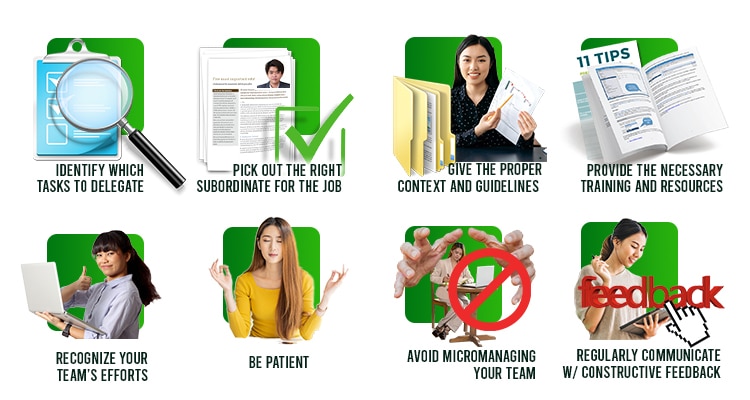Being a manager comes with a lot of responsibilities.
Aside from doing your assigned tasks, you must manage your team, report to your boss, and liaise with other department leaders.
Thus, one vital soft skill you must learn is effectively delegating tasks to your subordinates.
Allocating tasks to your subordinates allows you to focus on more pressing tasks while empowering and keeping employees engaged. This is especially important in an online work from home setup, where you can’t physically monitor your team.
Yet many managers find delegating tasks challenging.
Some believe it’ll take too much time to teach someone how to do their tasks, while others feel guilty assigning more work to their subordinates.
So, let’s talk about getting past that and delegating tasks effectively.

The Importance of Delegating
Effectively delegating tasks to your subordinates significantly improves your productivity and work-life balance. It helps prevent burnout and allows you to focus on more strategic matters where you’ll make a bigger difference.
Allocating tasks to your subordinates also enables them to learn new skills and prepares them for future responsibilities.
It’s also a clear sign of trust in their abilities and decision-making skills. This can significantly boost their commitment, morale, and productivity.

How to Delegate Tasks More Effectively
Effectively delegating tasks to your team can be challenging if you’re not used to it. Fortunately, here are 8 tips that can help you get started:
Identify Which Tasks to Delegate
It all begins with determining which tasks you can allocate to your subordinates. Obviously, you can’t delegate performance reviews to them.
Here are some questions to help you narrow things down:
- Is this a recurring task?
- Is there someone on my team more capable of doing this than me?
- Am I the only person capable of accomplishing this task?
- Does this task align with one of my team member’s interests/goals?
- Do I have adequate time to achieve all my tasks?
Pick Out The Right Subordinate for the Job
One of the hallmarks of a good leader is being in tune with their subordinates’ strengths, weaknesses, and interests.
Leverage these by delegating tasks that align with your subordinate’s skills or career goals.
If, for example, if one of your subordinates works an online design job, you can delegate related tasks to them.
Give the Proper Context and Guidelines
Providing clear instructions and expectations, along with the right tools for the task, helps set your employees up for success. Additionally, set reasonable deadlines for these tasks as well.
Provide The Necessary Training and Resources
In some cases, you may need to give additional training to help your subordinates carry out their delegated tasks.
This process can take time. However, this will not only help boost your managerial effectiveness, it will also give your subordinates new opportunities to grow.
Regularly Communicate With Constructive Feedback
Establishing proper communication channels with your team allows you to monitor their progress, answer any questions they have, and provide feedback.
Of course, feedback goes both ways. Were your instructions clear? Did you give them the necessary tools and training to succeed in their tasks?
Asking these questions helps you improve your ability to delegate tasks in the future.
Avoid Micromanaging Your Team
You may feel tempted to constantly hover over your subordinates’ shoulders when it’s your first time delegating tasks.
However, micromanaging your subordinates makes them feel you don’t trust them and inhibits their ability to be proactive.
To help you get more comfortable delegating tasks to your team, start with smaller assignments -and then get out of the way.
By displaying trust in your employees, you’re empowering them to behave autonomously, which can lessen your workload in turn.
Be Patient
Understandably, your subordinates may take longer to accomplish a task, at least in the beginning.
Thus, you should give your subordinates grace as they learn how to do their tasks.
Recognize Your Team’s Efforts
If your subordinates do a good job, tell them so.
A little bit of appreciation always goes a long way, and will spur them on to do even better in the future.

Ready to Start Delegating?
Like any skill, effectively delegating tasks takes time and effort to learn.
That said, the more you keep at it, the more your managerial skills will improve – and the more efficient you’ll be overall.
Need help finding work from home jobs? If so, Remote Staff is here to help.
Our jobs list contains plenty of openings to choose from, from online transcription jobs to architecture ones.
Ready to start your online career? Sign up here. Good luck!

